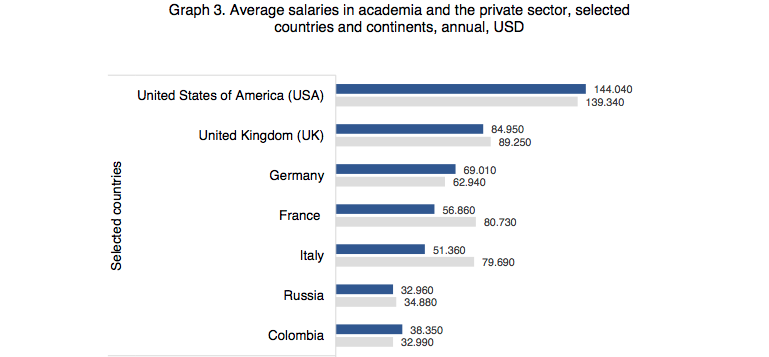The following article is archived and is no longer considered up-to-date. Please interpret its content in the context of the publishing date.

ARCHIVED
The United States Remains the Highest Paying Country for Working Economists
Read a summary using the INOMICS AI tool
The following is an analysis of data taken from the INOMICS Salary Report 2018 - downloadable for registered users here. Specifically, it looks at the average salaries of economists working in academia and the private sector across the world.
This year’s Salary Report Survey had more respondents than any previous year. As a result, its data is more diverse, representing the salary information, highest academic degree acquired, level of seniority, work experience and job type of over 2000 economists from 116 countries. The geographical extension of the sample from previous reports has facilitated a more sophisticated analysis of salary trends across a wider range of countries, and, in turn, has made possible a more revealing comparison between said regions – the theme of this insight. These geographical assessments can also be viewed against trends in time. For example, wages in certain areas can be seen increasing since 2016, while elsewhere the reverse is taking place. For an economist looking to settle down, particularly in the mid to long term, such patterns could be of huge importance to their decision-making.

The data, once again, is separated into the salaries of those working in academia and those in the private sector. In general, salaries in most countries are higher in the private sector, but for a number of notable exceptions: in the USA, Germany and Colombia private sector workers earned around 10% less than their academic counterparts. With regard to North America (also including Canada), this trend is new, and a change from last year’s findings, when private sector worker pay tended to outstrip that in academia. No doubt economists will watch keenly to see if this inclination persists.
The figures for Italy and France were, perhaps, the most anomalous, showing the largest discrepancies between earnings between the sectors. In Italy, those in the private sector earned, on average, almost $30,000 more than the academic counterparts, while in France, the difference, though not quite as large, was still around $23,000 - food for thought for an economist eyeing work in either country. Comparably, there is far less separating the earnings of the two sectors in the other countries surveyed, where the difference generally stands around $6,000 or less.
In keeping with last year’s findings, the United States remains, by some stretch, the most lucrative place to work as an economist, the average salary in academia a sizable $144,040, compared to $139,340 for those working privately. These figures dwarf the next best-paying country, the UK, where economists in academia can expect to earn, on average, around $85,000, and almost $90,000 in the private sector. Referring back to the previous Salary Report, private sector pay in the UK can be seen spiking. Hitherto, those in academia, on average, outearned those in the private sector. However, in the last two years, that trend has inverted. Wages have dropped slightly in academia, whilst surging in the private sector.
-
- Postdoc Job
- Posted 1 week ago
Postdoctoral Research Fellow Opportunity
At University of Notre Dame in Notre Dame, United States
-
- Postdoc Job
- Posted 6 days ago
Research Assistant (Postdoctoral Fellow) (f/m/d)
At University of Bremen in Bremen, Germany
-
- PhD Program, Program, Postgraduate Scholarship
- Posted 11 hours ago
PhD Program in Management - 11 Fully Funded Scholarships
at Luiss Guido Carli University of Rome in Rome, Italy













